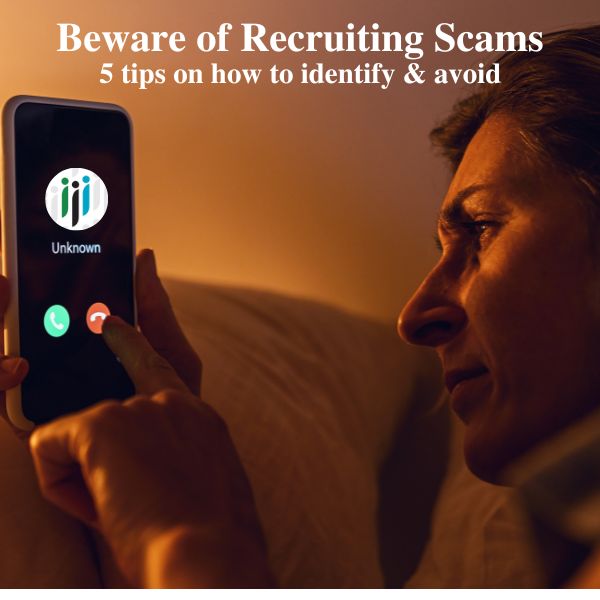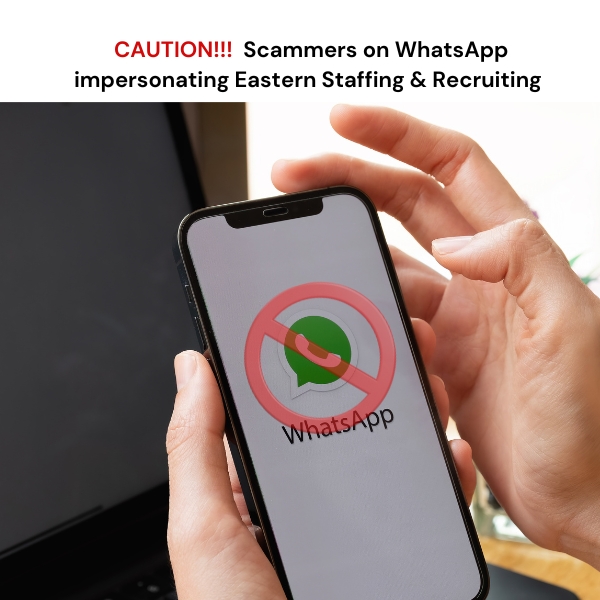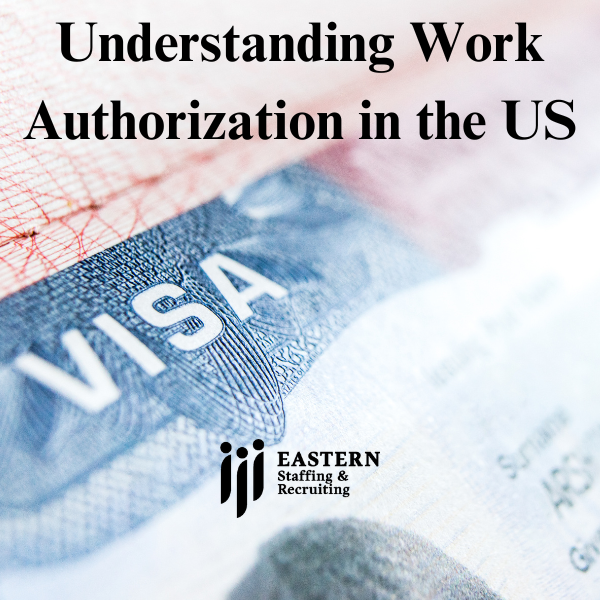Recruiting Scams: 5 Tips to protect yourself
How to Recognize Signs of Recruitment Scamming
In today’s digital world, where personal information like phone numbers, email addresses, and home addresses are frequently requested, scams, spam, and phishing attempts are on the rise. With job seekers increasingly relying on digital platforms to find employment, scammers have become more sophisticated in their attempts to trick individuals with fraudulent job offers. In fact, job scams surged by 118% in 2023, driven in part by the use of generative AI to craft believable fake communications, according to a report from CNBC.
Key Warning Signs
- Unsolicited messages: If you receive unexpected messages from recruiters, exercise caution. Legitimate recruiters will typically provide specific details about the job opportunity. Be wary of generic messages that lack a human touch, personalized information, or those that seem too good to be true. With the rise of generative AI, scammer communication is becoming increasingly harder to detect and even more believable. Always stay vigilant and research the sender thoroughly.
- Communication methods: Credible companies typically do not use WhatsApp or similar messaging platforms for official business communication. Recruiters generally communicate via phone, email, LinkedIn, or job boards (e.g., Indeed, ZipRecruiter). Recruiters on LinkedIn should always be associated with the company they claim to represent. Verify their employment by checking the company’s official LinkedIn page. If you are still uncertain about the legitimacy of the communication, set up a time to speak with the recruiter to verify their authenticity.
- Too Good to Be True: If the position or salary offered seems too good to be true, it probably is. For example, if an entry-level position offers $85,000 annually for only 20 to 25 hours of work per week, it may be a good idea to research the company and job further before applying. If the offer seems exaggerated or implausible, always verify it through the company’s official website or a trusted job board.
- Requests for payment or personal information: Legitimate companies will never ask you to pay for job placement or provide sensitive personal information such as your Social Security number, banking details, or driver’s license early in the hiring process. Scammers may use your private information as collateral for extortion or hacking. Recruiting companies are typically paid by employers, not candidates, and will not require payment from you at any point.
- Verify the sender’s email address: Scammers often use email addresses that closely mimic legitimate companies, making it difficult to detect the fraud. For example, a scammer might use companyjobs.com instead of company.com. Always ensure the sender’s email comes from the company’s official domain. When in doubt, go directly to the company’s website to verify that the email domain is legitimate.
What to Do If You Suspect a Scam
If you believe you’ve encountered a recruitment scam, report it immediately to the following authorities:
- Federal Trade Commission (FTC): Report fraud at https://reportfraud.ftc.gov.
- Internet Crime Complaint Center (IC3): File a report with the FBI at https://www.ic3.gov.
- Your State Attorney General’s Office: Report fraud to your state’s attorney general for further investigation. Find your attorney general at https://www.naag.org/find-my-ag/.
- Text: Alert the phone carrier by copying the text message and forwarding it to 7726 (SPAM).
By staying informed and vigilant, you can protect yourself from falling victim to recruitment scams. For additional information on job scams, refer to the Federal Trade Commission’s alert.
If you believe you have been contacted by an individual impersonating Eastern Staffing & Recruiting, please contact us:
Eastern Staffing & Recruiting | South Carolina Staffing
4900 O’Hear Avenue, Suite 100
North Charleston, SC 29405
Phone: (843) 408-0550
Eastern Staffing & Recruiting | Binghamton Staffing
4100 Vestal Road
Suite 101
Vestal, NY 13850
Phone: (607) 723-7058
More Like This
Scammers Impersonating Eastern Staffing & Recruiting Recently, we have been alerted to fraudulent activity where individuals are using our [...]
What Does it Mean to be Work Authorized in the United States? Being work authorized means that an individual is [...]
Why Choose the Third Shift? Key Benefits and Opportunities Working the third shift, typically from 11 p.m. to 7 a.m., [...]




